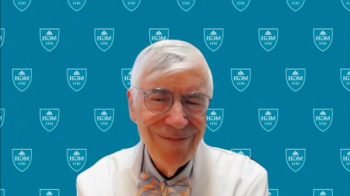
Consequences of Disease Progression in Lupus Nephritis
Rheumatology and nephrology experts discuss monitoring of patients, renal flares, and consequences of progression in lupus nephritis.
Episodes in this series

German Hernandez, MD, FASN, FACP: The way we monitor patients with lupus nephritis is by following certain markers to make sure they’re not progressing to more kidney damage and, if we’re treating them, making sure they’re responding to treatment. The main biomarker we use in nephrology is the amount of protein that’s being spilled by the kidneys. Typically, we’ll check urine protein and creatinine, and take the ratio of that. That’s an estimate of how much protein patients are spilling. A good response to treatment could mean that there’s at least a 50% reduction in the level of protein being spilled by the kidneys. A complete renal response to treatment would be if the patient is spilling less than 500 mg.
To give you some context, patients can present with 3000 or 4000 mg of protein in the urine. Getting that protein level in the urine down is the goal of treatment for patients with lupus nephritis. That’s the marker we use to assess the severity and response to treatment. If patients aren’t being treated or diagnosed, they can progress to worsening kidney dysfunction because the kidney is undergoing constant attack by inflammatory cells and substances that can eventually lead to a scarred kidney. About 10% to 15% of patients with lupus nephritis can progress to end-stage kidney disease requiring renal replacement therapy, whether this is dialysis or kidney transplant.
It’s important that we follow the level of proteinuria to look for response to treatment. Patients can have a good response to treatment and then have a renal flare, in which there’s the recurrence of blood or protein in the urine. Along with these 2 markers of protein and blood in the urine, we can also follow other inflammatory markers, such as complement levels, like the C3 and C4, and the titers of double-stranded DNA antibodies. We can follow those markers to gauge disease severity, response to therapy, and in a patient who’s achieved remission, whether they’re having a renal flare.
Ellen Ginzler, MD, MPH: We always aim to treat lupus nephritis as quickly as possible so that there aren’t any long-lasting effects or damage. But lupus nephritis is a form of inflammation of the kidneys, so if the inflammation continues over time, you’ll also get scarring, or what we call fibrosis, and the changes of high blood pressure, or hypertension, in the kidney. The faster you can treat lupus nephritis, the less likely you are to develop these irreversible changes. Once those irreversible changes develop, even if you shut off the autoimmune part of the disease, the impairment of kidney function may continue so that you may eventually develop end-stage kidney disease, or kidney failure, and require dialysis or a kidney transplant.
When patients have a renal flare and don’t get treated, it’s very unusual for them to get better on their own. It’s not like some other features that you can have for a while and then they get better. If you have lupus nephritis and it’s untreated, that inflammation continues and more immune complexes are deposited. That causes changes in the kidney tissue and function so that wastes aren’t cleared as well and protein continues to be spilled.
Then there are often other effects. As I said, hypertension is a very common secondary feature of untreated lupus nephritis, and so is the development of high cholesterol and other lipid levels. Those in turn can cause problems with blood pressure. Even diabetes can develop in untreated patients. One thing we definitely know about lupus nephritis is that the earlier you diagnose it and the more successfully you can treat it, the less likely you are to have these irreversible damages to the kidneys that can lead to kidney failure and the need for dialysis or transplantation.
Transcript edited for clarity.
Newsletter
Stay ahead of policy, cost, and value—subscribe to AJMC for expert insights at the intersection of clinical care and health economics.








